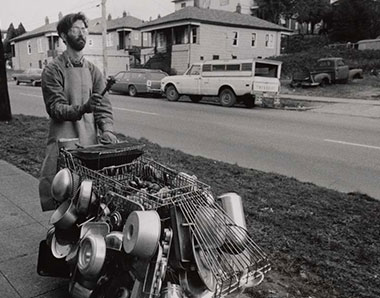"THE FACT IS, COLLEGE HAS NEVER BEEN MORE NECESSARY, BUT IT'S ALSO NEVER BEEN MORE EXPENSIVE."
Barack Obama, "Speech at Henninger High School, Syracuse"
(speech, Syracuse, NY, August 23, 2013), http://www.syracuse.com/news/index.ssf/2013/08/a_transcript_of_president_obamas_speech_in_syracuse.html.
back to top
back to top
Consider Shane Gill, a 33-year-old high-school teacher in New York City. He does not have a car. He does not own a home. He is not married. And he is no anomaly: like hundreds of thousands of others in his generation, he has put off such major purchases or decisions in part because of his debts.
Mr. Gill owes about $45,000 in federal student loans, plus another $40,000 to his parents. That investment in his future has led to a secure job with decent pay and good benefits. But it has left him with tremendous financial constraints, as he faces chipping away at the debt for years on end.
"There's this anxiety: what if I decided I wanted to get married or have children?" Mr. Gill said. "I don't know how I would. And that adds to the sense of precariousness. There's a persistent, buzzing kind of toothache around it."
Annie Lowery, "Student Debt Slows Growth as Young Spend Less," New York Times, 10 May 2013: 1+.
Ultimately I'm at Skidmore to change my class, that's why I'm at college, that's why we're all at college, to be able to live comfortably. And it's this weird balance between being open about, 'yes, I'm working class and everything, but at the same time I'm at college because I don't want to be working class, because I want to, when I graduate, work with my mind and sit in a comfortable chair, not working physically, not cleaning peoples toilets, not building their houses or sweeping the streets.' You know I don't want to be doing that and that's why I'm here.
Classless Society Stories Project
Actually, just because [the U.S. is] a democracy, class distinctions have developed with greater rigor than elsewhere, and language, far from coalescing into one great central mass without social distinctions, has developed even more egregious class signals than anyone could have expected. ...Interviewed by sociologists, [Americans] indicate that speech is the main way they estimate a stranger's social class when they first encounter him. "Really," says one deponent, "the first time a person opens his mouth, you can tell."
Fussell, Paul. Class. New York: Ballantine, 1983: 117
THERE'S THIS ANXIETY: WHAT IF I DECIDED I WANTED TO GET MARRIED OR HAVE CHILDREN?...
CLICK TO READ
ULTIMATELY I'M AT SKIDMORE TO CHANGE
MY CLASS...
CLICK TO READ
THE FIRST TIME A PERSON OPENS HIS MOUTH, YOU CAN TELL...
CLICK TO READ
I KNOW YOU WANT TO GO TO COLLEGE AND I CAN'T AFFORD TO
SEND YOU...
(0:53 min)
I THINK THERE'S
A DIFFERENT TYPE OF AMERICAN
DREAM NOW...
(1:15 min)
I CERTAINLY DO NOT BELIEVE IN THE AMERICAN DREAM...
(0:47 min)
CLICK TO PLAY AUDIO
CLICK TO PLAY AUDIO
CLICK TO PLAY AUDIO
back to top
back to top
-
DEMAND FOR HIGHER EDUCATION
One of the major markers of class, a higher level of formal education generally guarantees enhanced social standing as well as increased economic potential in the workforce. Originally reserved for the elite, postsecondary education came within reach of the middle classes in the early twentieth century, with the creation of large universities, especially in the midwest, to educate aspiring businessmen. Following World War II, the GI Bill allowed many working-class Americans to afford college, and affirmative action programs in the latter part of the century expanded access even further. Today more students than ever enroll in the nation's institutions of higher learning, including millions in community colleges. Ironically those numbers have somewhat deflated the perceived value of a degree. These days many businesses expect a bachelor of arts or bachelor of science degree, even for positions that once required only a high school diploma; the ambitious must therefore attain ever higher levels of education to distinguish themselves.
-
EDUCATIONAL EXPECTATIONS
Not coincidentally, the trajectory of the educational system - from grammar school to high school to college and beyond - enables a narrative of progress that equates each graduation level with another rung in the ladder rising toward financial security. Higher education in particular condenses and intensifies this narrative, since a college degree has long represented a passport out of poverty and the working class. In the public imagination virtually no other acquisition, short of a winning lottery ticket, wields the class-transformative power of higher education.
-
UNEVEN ACCESS
Yet schools themselves, far from acting as great equalizers, can harbor class schisms, making education an arena that often reinforces class distinctions rather than erasing them. Such divisions start in the youngest grades, where disadvantaged children do not enjoy equal access to quality preschool programs. In the elementary and middle school years, racial and ethnic segregation and the uneven distribution of federal and state monies divide school districts along economic lines, hampering needy students from under-resourced schools in preparing for college. Impoverished high school students, lacking both academic and personal support, more often drop out than those from middle-income or higher-income families. And despite recent efforts to increase the numbers of underprivileged enrollees in postsecondary institutions, most selective colleges and universities accept disproportionately high numbers of students from the middle and upper classes. Thus while education provides a sound path to upward mobility, not everyone enjoys equal access to it.
back to top

